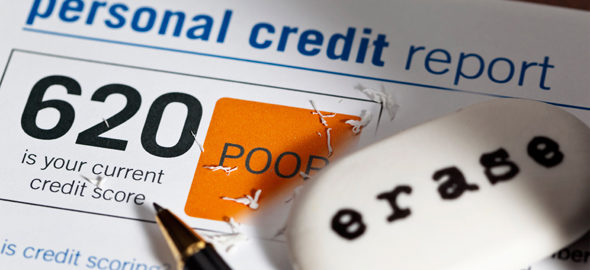So you’re considering buying a home and you’ve got it all planned out: a four-bedroom home in the top local school district and your favorite neighborhood including a manicured lawn, a finished basement with a theater room and—why not?—an outdoor kitchen.
Slow down… one of the first steps in buying a home is to clean up your credit score, also called a FICO score—a simplified calculation of your history of paying back debts and making regular payments on loans. If you’re borrowing money to buy a home (as most do), lenders want to know you’ll pay them back in a timely manner, and a credit score is the best tool to estimate the odds that you will do so.
Here’s your crash course on credit scores and how to improve it to ensure you get the best possible mortgage interest rate.
Pull your credit report
There are three major U.S. credit bureaus (Experian, Equifax, and TransUnion), and each provides its own credit score and report (a more detailed history that’s used to determine your score). Their scores should be roughly equivalent, although they do pull from different sources. For example, Experian considers on-time rent payments while TransUnion has detailed information about previous employers.
You can access these reports using AnnualCreditReport.com. Here you can get a free copy of your report every 12 months from each credit-reporting company. It doesn’t include your credit score, though—you’ll have to go to each company for that, and pay a small fee.
Or check with your credit card company: Some, including Discover and Capital One, offer free access to scores and reports. Once you’ve got your report, thoroughly review it page by page, particularly the “adverse accounts” section that details late payments and other slip-ups.
Assess where you stand
It’s simple: The better your credit history, the higher your score—and the better your chances of securing a home loan under the best possible terms. The Federal Housing Administration (FHA) requires a minimum credit score of 580 to permit a 3.5% down payment, however, most major lenders require a score at least 620, if not more. So what can you do if your credit report is less than stellar? Don’t panic, there are ways to clean it up.
Dispute any errors
A 2013 Federal Trade Commission study found that 5% of credit reports contain errors that can erroneously ding your score. So if you spot any, start by sending a dispute letter to the bureau, providing as much documentation as possible, per FTC guidelines (you can all or email us for a free copy of a dispute template). You’ll also need to contact the organization that provided the bad intel, such as a bank or medical provider, and ask it to update the info with the bureau. This may take a while, and you may need documentation to make your case. But once the bad info is removed, you should see a bump in your score.
Erase one-time mistakes
So you’ve made a late payment or two—who hasn’t? Call the company that registered the late payment and ask that it be removed from your record. If you had a mistake and missed just a payment or two, many companies will indeed tell their reporting division to remove this from your credit report. Granted, this won’t work if you have a history of late payments, but for small errors, it’s an easy boost for your score.
Increase your limits
One easy way to increase your credit standing is to simply pay off your debt. Not an option right now? Here’s a cool loophole: Ask your credit card companies to increase your credit limit instead. This improves your debt-to-credit ratio, or utilization ratio, which compares how much you owe to how much you can borrow.
Having $1,000 of credit card debt is bad if you have a limit of $1,500. It isn’t nearly as bad if your limit is $5,000. The simple math: Although you owe the same amount, you’re using a much smaller percentage of your available credit, which shines well on your borrowing practices.
Pay on time
If you’re often late with payments, now’s the time to change. Commit to always paying your bills on time; consider signing up for automatic payments so it’s guaranteed to get done.
Give yourself time
Unfortunately, negative items (such as those habitually late or nonexistent payments) can stay on your report for up to seven years. The good news? Changing your habits makes a big difference in the “payment history” segment of your report, which accounts for 35% of your score. That’s why it’s essential to start early so that you’re sitting pretty once you’re shopping for homes and find one that makes you swoon.
Once you’ve set your credit on a better path, it’s time to tackle the next major hurdle: saving for a down payment.
Can’t Afford 20% Down? You Have Options!
If you, or someone you know is considering Buying or Selling a Home in Columbus, Ohio please contact The Opland Group. We offer professional real estate advice and look forward to helping you achieve your real estate goals!
The Opland Group Specializes in Real Estate Sales, Luxury Home Sales, Short Sales in; Bexley 43209 Columbus 43201 43206 43214 43215 Delaware 43015 Dublin 43016 43017 Gahanna 43219 43230 Grandview Heights 43212 Hilliard 43026 Lewis Center 43035 Marysville 43040 43041 New Albany 43054 Pickerington 43147 Powell 43065 Upper Arlington 43220 43221 Westerville 43081 43082 Worthington 43235








